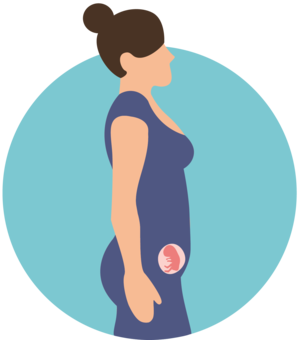Pregnancy at week 14
4-minute read
Your baby
By 14 weeks, your baby weighs about 45g and is about 11cm long – the size of a lemon. Its organs have formed, including the ovaries and testicles.
The face is becoming more recognisable, with a longer neck and fully developed eyes, which are covered by fused eyelids. The fingers and toes are growing nails.
The baby’s reflexes have started working – if you were to touch their hands or feet, they would curl or close. You can’t feel it yet, but the baby is moving around. The vocal cords are working and the baby can cry.
Your baby at 14 weeks
| Length: | 11cm |
| Weight: | 45g |

Your body
The second trimester is when many women start to feel more energetic and active. Hopefully your morning sickness is disappearing by now and you should be more comfortable now.
Your 'baby bump' might start to become more noticeable. Your breasts may be getting larger and may already be making colostrum.
You might notice new moles or skin tags developing on your body. These are nothing to worry about, but chat to your doctor or midwife if they’re bothering you.
Things to remember
Now you’re feeling more energetic, doing more physical activity will help keep you in shape for your pregnancy. Exercising will prevent you from putting on too much weight and is also good for your mood.
If you were fit and active before you fell pregnant, it’s OK to carry on with a light to moderate exercise program. But don’t suddenly start a lot of exercise for the first time while you’re pregnant. Chat to your doctor about what’s best for you.
Aim for 150 minutes of exercise per week, or 30 minutes on most days. It’s probably best not to exercise for more than 60 minutes at a time while you’re pregnant. Both aerobic and strengthening exercises are fine.
Read next

Your pregnancy at 15 weeks
Learn about your pregnancy journey and what is happening to you and your baby.

Speak to a maternal child health nurse
Call Pregnancy, Birth and Baby to speak to a maternal child health nurse on 1800 882 436 or video call. Available 7am to midnight (AET), 7 days a week.
Learn more here about the development and quality assurance of healthdirect content.
Last reviewed: August 2020




